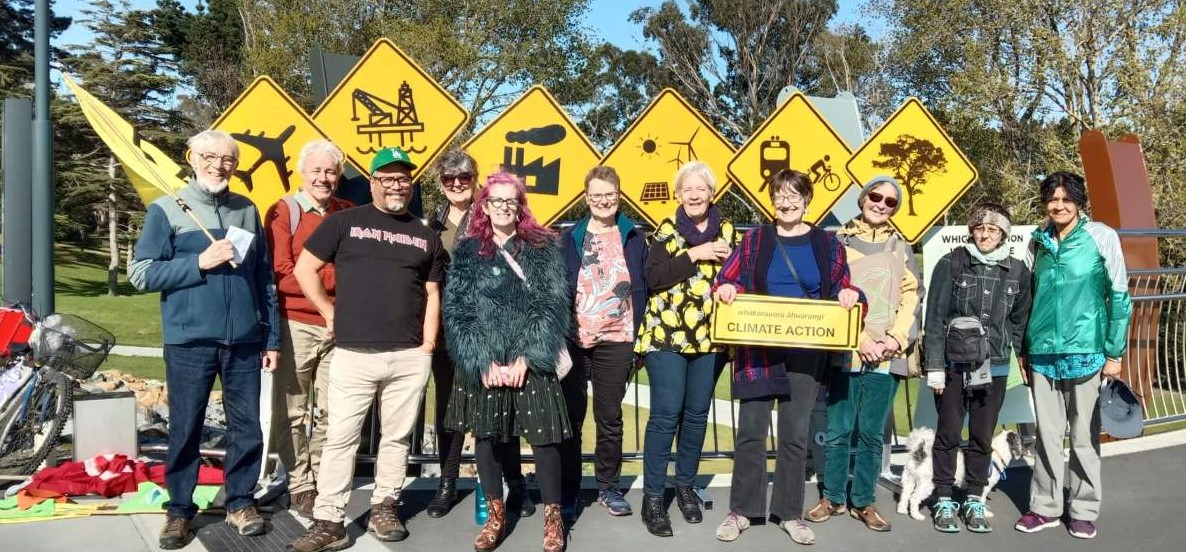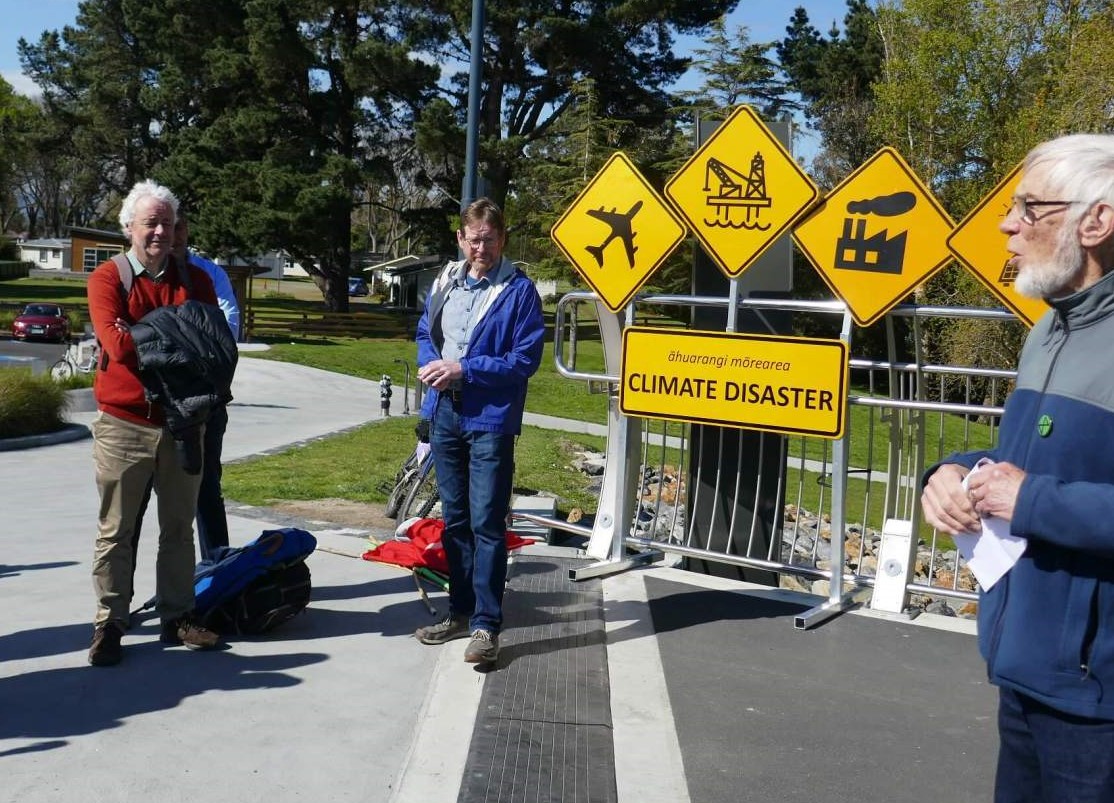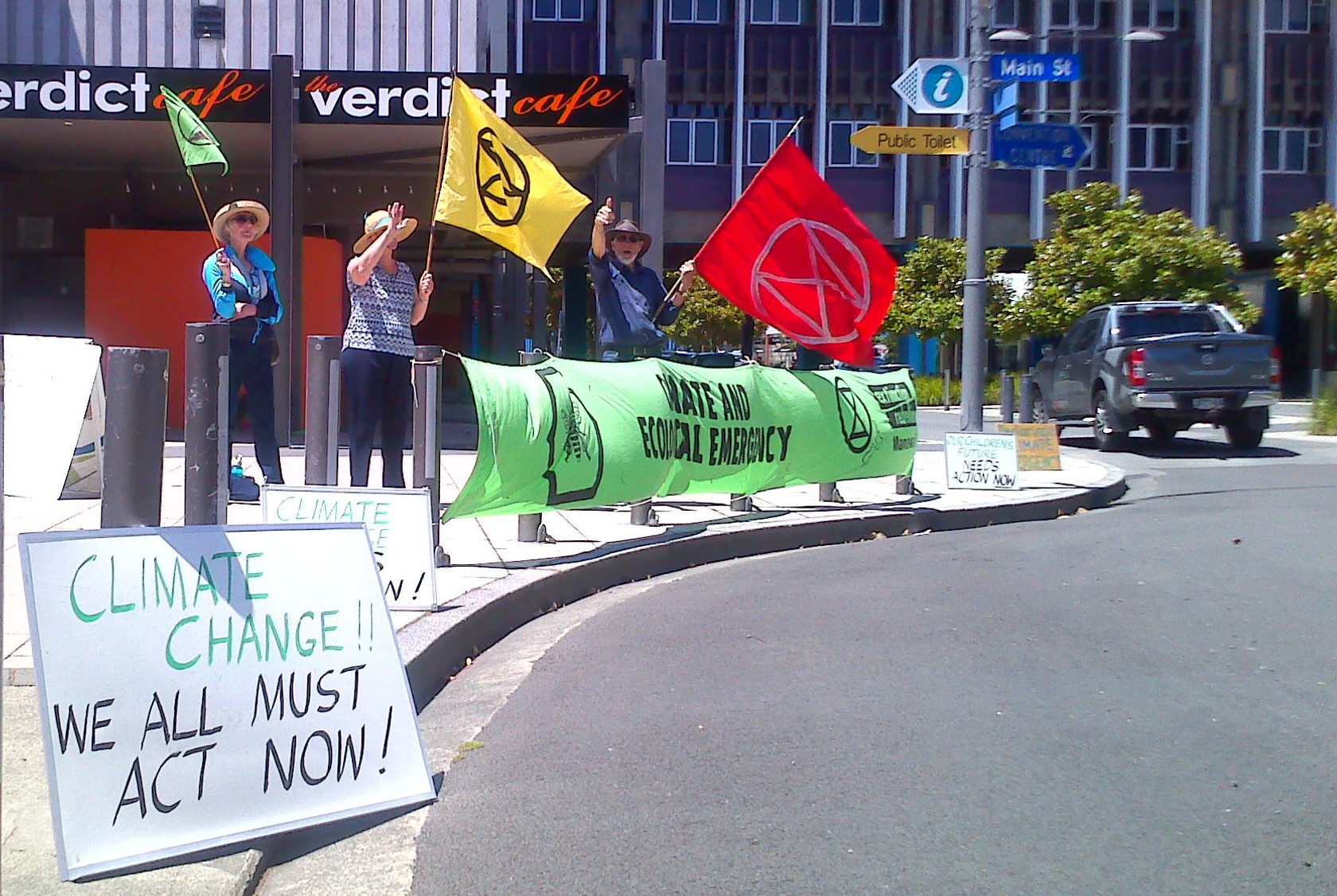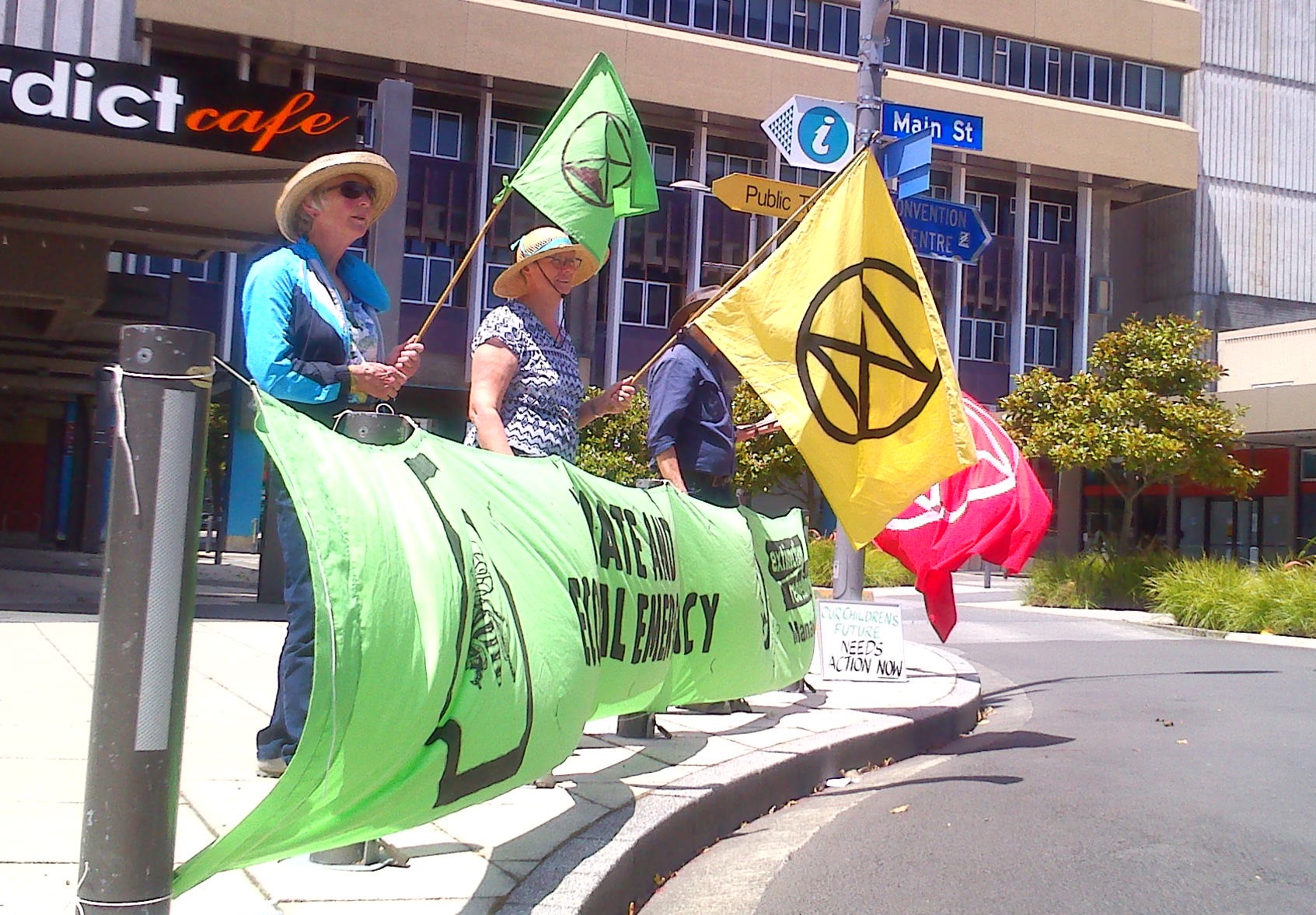By Karen Tutt
Extinction Rebellion (XR) is a decentralised, international and politically non-partisan movement using non-violent direct action and civil disobedience to persuade governments to act justly on the Climate and Ecological Emergency. There are now 1,145 XR groups in 73 countries.
Extinction Rebellion asserts that we are on the brink of a global catastrophe; scientists agree we are entering a period of climate and ecological breakdown. From wildfires to heatwaves, droughts to rising sea levels, the symptoms of our inaction will only worsen, the longer we take to address the causes of this crisis.
I sat down with six members of XR Manawatū in October 2020, to talk about the movement that is trying to provoke system change.
The Values of Extinction Rebellion
Phil, Angela, Beth, Peter, Helena and Rachael went through the eleven values of XR, which are the basis for their activism.
Phil McConkey is a retired social worker who has been engaged with social justice issues for much of his life. He commented that the 11 values of XR are like an affirmation, a karakia.
Number one: A shared vision of change, creating a world that is fit for generations to come. Facts are often not enough to influence people. “So how do we create change? This is a question that exercises us a lot”. “Being the change you want to see in the world”, says psychologist Angela Baker. “Even if you could wave a magic wand and change the world, you have to change values – for example, power structures – or things will just go back to being how they were before.”
Number two is setting a mission on what is necessary; mobilising 3.5% of the population to achieve system change. Phil says that this is considered to be the critical point, a tipping point, although there is debate whether that number is still valid.
Number three: A regenerative culture; creating a culture which is healthy, resilient and adaptable. Phil says they try to have this as the culture of the group. Beth Tolley, a retired physiotherapist, says, “That’s the thing about XR that I feel very challenged by. I feel like it’s a rehash of what I learned in the 1970s. I find it difficult, to be told that this is wonderful new stuff! But I think it’s good they’re working on it.”
Phil agrees. “I’ve been around for a long time. I was teaching group process about forty years ago! But anyway – we’ve got this younger generation who have come up through XR. I see it as a task to do, I want to call people together, to be able to talk about it. Just on Facebook alone, the number of people who are saying they’re struggling with the realities of what we’re facing, as a species and as a planet. So I want to create a space where people can talk about that. Also I want to stand back and look at the big picture, the global picture. That is needed, for the system to change.”
Listening respectfully enables people to challenge their own beliefs, and be open to thinking differently. “I like the fact that XR emphasises that; opportunities for people who feel overwhelmed by climate change to just talk about their fear” says Angela.
Four: We openly challenge ourselves and this toxic system, leaving our comfort zones to take action for change. Phil says, “We’re asking our group and each other to stretch ourselves, in the protest action we’re taking.” Beth says, “one example of this is just in how we live our lives – living lightly on the earth.” Angela: “Being disruptive, breaking the law. And challenging each other.”
Five: We value reflecting and learning; following a cycle of action, reflection, learning, and planning for more action. Learning from other movements and contexts as well as our own experiences. John says, “We have to welcome dissent. And it’s so easy to say, oh yes, I’ll always do that, but we don’t. I don’t. I get frustrated, because I want to get on and do.”
Six: We welcome everyone and every part of everyone, working actively to create safer and more accessible spaces. “Including their dissent!” says Phil. “I don’t know if we achieve it; I don’t know if any group achieves it.”
Seven: We actively mitigate for power, breaking down hierarchies of power for more equitable participation.
Eight: We avoid blaming and shaming. We live in a toxic system, but no one individual is to blame. Phil: “It’s owning up to our tendencies. It’s so easy to find somebody to blame.”
Nine: We are a nonviolent network, using nonviolent strategy and tactics as the most effective way to bring about change. Phil: “There has been a lot of emphasis on nonviolence, throughout XR’s history. Most change groups affirm this.”
Ten: We are based on autonomy and decentralization; we collectively create the structures we need to challenge power. Angela says “They call it a self-organizing system. It can be agile, but it can also be a problem. In 2019 there were XR protests in London which stopped the public transport system during rush hour, there were XR national representatives, as well as local groups, trying to coordinate, without becoming a hierarchy.”
Eleven: We honour and respect te Tiriti o Waitangi and Tino Rangatiratanga.
Actions for Change
In support of #FridaysForFuture, XR Manawatū holds a safe, peaceful and family friendly action each Friday from 10am to 1pm, by the City Council building in The Square, for climate justice visibility, conversation and information. Fridays for Future is a movement that began in August 2018, after 15-year-old Greta Thunberg and other young activists sat in front of the Swedish parliament every schoolday for three weeks, to protest against the lack of action on the climate crisis.
XR Manawatū have a presentation about climate change and what to do about it, which they have given to many interested local groups. In addition, they’ve had banner art workshops, potluck dinners, picketed polluting industries, and ‘greened’ the local Labour MP’s office, hanging banners and chalking the pavement, calling on the government to tell the truth about the climate and ecological emergency, and take the measures required to meet the Paris Agreement on climate change.
Angela recalls the XR roadshow which travelled the length of the country in the leadup to the 2020 General Election, finishing in Wellington outside Parliament. The roadshow promoted three election issues: the declaration of a national climate emergency; a Citizens’ Assembly on climate next year; and a green post-COVID-19 economic recovery plan. In Palmerston North, about a dozen people gathered at He Ara Kotahi pedestrian and cycle bridge to meet the roadshow, and listen to talks by local experts.
Extinction Rebellion Manawatū is a little bit in limbo at the moment; COVID-19 dampened everything down, and they are waiting to hear about the national strategy coming out of the national XR hui that was held in November.

Phil, Rachael, Angela, Beth, Margaret, Helena and others meeting the XR NZ Roadshow in September 2020


Margaret, Angela and Phil waving cheerfully to motorists one Friday in The Square.

Why We Joined
I first met Phil a year or two ago, one Friday morning on a corner of The Square. I was riding by on my bicycle, and he was holding a placard. We chatted about XR; he talked about people of his acquaintance in their thirties, who had decided they were not going to have children, because of the looming ecological crisis. He says, “I’ve been involved in climate change action for many years. I had been a member of the Green Party, and I’ve been writing letters to the newspaper, and to MPs, for years – getting nothing much but clap-trap answers from politicians. In 2018 we heard about XR shutting down bridges in central London. This is similar to protests I went on decades ago; the Springbok Tour, nuclear disarmament. And I thought, here is an action I can respond to. Here was a way to get back on the street.
"What’s my motivation? My grandchildren - the kind of world they are heading into. It resonates with my lifelong fight for social justice. It’s not just my grandchildren, it’s all the bloody creatures of the planet. We’re taking away their right to live, daily, with our actions. It’s not fair, it’s not just, and I have to do this, until I die.”
Peter says, “It’s sometimes difficult to describe, what event, if there is one event, which changes your view, and makes you want to do something different. XR is a way of demonstrating some active participation, in working towards change. I had three years as a city councillor – and this proved to me, how ineffective you can be! I left, because I have no faith in the system. If I had an answer, I’d be off doing it. Stop talking, and start doing.”
Helena has a vege garden. In 2016 there were water restrictions, so she couldn’t water the garden; she was collecting water in buckets in the shower. She went to an XR talk in 2018, which was an eye-opener. It was actually quite a shock; she got quite down about the situation. Then she went to an A Rocha nursery working bee, to “get some of this carbon dioxide out of the air!”
Angela recalls that when she was about ten or twelve, her mother heard an interview about Rachel Carson’s book The Silent Spring; about how birdsong had been lost in the United States. This book was published in 1962, and documents the adverse environmental effects caused by the indiscriminate use of pesticides. "Then it all seemed to go quiet. What got me involved in XR was the growing sense that this is serious, this is critical; the scientists are all saying, we haven’t got enough time, we’ve got to stop now. XR is trying to get governments to declare an emergency – it’s not just a symbolic thing, the house really is on fire.
"I also like the idea of doing things that are playful, mischievious, fun – dressing up, singing. Take action, but don’t get caught down in the dumps. Just keeping on acting, doing stuff, until we can’t any more. For me it’s my grandkids, and my thirteen-year-old niece - she participated in the Student Strike."
Extinction Rebellion has a traffic-light system to indicate the type of involvement a person is willing to take. If you’re willing to be arrested, that’s “red”. Then there’s “yellow”; active roles like press liaison, police liaison, or supporting the people who are “red”, who are, say, gluing themselves to buildings – bringing them food and water, making sure they’re warm enough. People who are willing to turn up to marches, be supportive, walk up and down the street handing out leaflets, do the background work, that’s “green”.
Beth went to a talk back in the early 1970s, about limits to growth. “That was my introduction to the whole environmental issue. Then I had children, so I was busy with that, but I was always interested in social justice. One of the things that motivates me is my grandkids; sometimes I can’t bear to think of what they might have to go through in the future.
"I sometimes get caught between the need to communicate versus the need to demonstrate. For example, some of the City Councillors, they are really interested in the climate issue, so I have become more involved in lobbying. Public protest and actions can be more fun than writing submissions, but unless the action is very clearly linked to the point the group wants to make it is a waste of time and energy.
"When I first got involved, I thought, I don’t mind getting arrested, but now, I’m dealing with some health conditions, so I’m backing away from that a bit. There is a wider group of people who will come along to events, but not many people want to get involved in the organizing. The challenge is having enough people to do that job."
Rachael notes the translation of XR values into Māori has a distinctly different flavour, to just reading them in English. This was to be a topic of discussion at the national hui; indigenous knowledge on sustainability. Phil points out that in each country, XR has its own cultural and historical milieu. Each group is developing in its own way; they have to adapt to their local culture.
Rachael says, XR can be seen as a movement of movements; all the different issues interconnect. Just after lockdown, there was a big hui in Wellington, Alternative Aotearoa, about what would be needed for the social, environmental and economic transformation of Aotearoa, to avoid the deeply embedded problems from the pre-pandemic era. XR Manawatū wanted to have a similar hui, bringing together people concerned about social justice issues, and those concerned about environmental issues - because they are all interconnected. Some members of XR and of ENM attended the Social Wellbeing Forum in Palmerston North in 2019, and XR provided guest speakers at the Palmerston North Community Services Council AGM in 2020. This dialogue is ongoing.
If you would like to get involved with Extinction Rebellion Manawatū, go to The Square on Fridays from 10am to 1pm, or find them on Facebook.
